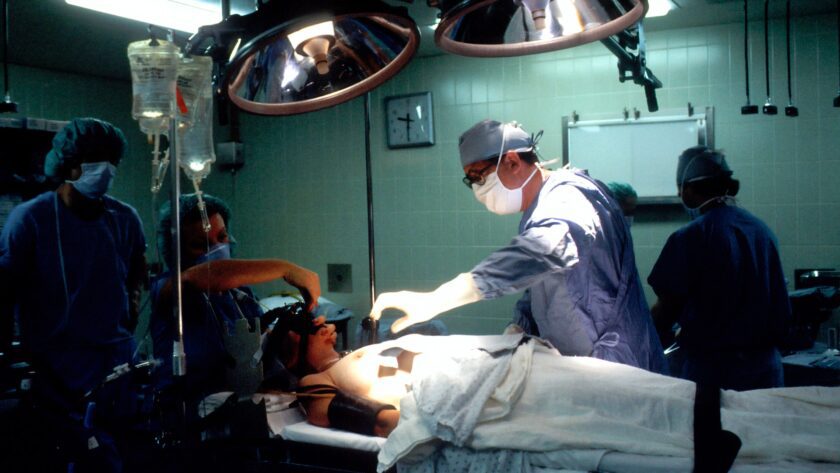The Mayo Clinic states that bariatric surgery can change your digestive system to ensure you lose weight. The surgery is advised by doctors when exercise and diet fail for weight loss or when an individual has serious health problems. A few procedures restrict the eating capacity, while others work by limiting the body’s capacity to take in nutrients.
Simply put, bariatric surgery is performed to help individuals lose extra weight and avoid suffering from life-threatening ailments linked to it, such as:
- Stroke and heart ailments
- Sleep apnoea
- High blood pressure
- Non-alcoholic fatty liver disease
- Type 2 diabetes
In this blog, we will focus on who should consider bariatric surgery and how to find the right bariatric surgeon for a successful and hassle-free procedure.
The Right Candidate for a Bariatric Surgery
According to the CDC (Centers for Disease Control and Prevention), over 42% of the population in the United States suffers from obesity. From this, only 1% of people qualify for bariatric surgery.
In December 2022, the Cleveland Clinic reported that the “International Federation for the Surgery of Obesity and Metabolic Disorders” and “The American Society for Metabolic and Bariatric Surgery” are the two prominent authorities for bariatric surgery. Both of these organizations published its recent guidelines in 2022 that suggest this surgery should be considered for:
- Adults whose BMI is 35 and above
- Adults with a BMI between 30 and 35 who are also suffering from Type 2 diabetes
- Adults having a BMI between 30 and 35, who haven’t achieved weight loss or cured obesity through other procedures
- Kids and adolescents with a BMI over 40
- Kids and adolescents with major conditions linked to obesity
Choosing the Correct Bariatric Surgeon
A bariatric surgeon specializes in weight loss surgery and can help to make the patient undergoing the surgery think positively. They help to make life-changing decisions that have long-term benefits. It is necessary to select the correct surgeon who will understand your unique weight loss goals.
Bariatric & Metabolic Center of Colorado asserts that bariatric surgeons aim towards the overall wellness of an individual, after the surgery. That means, their job doesn’t end once the surgery is over. The surgeon should have a partnering approach when treating a patient and provide ways to enhance their health. After the surgery, they should guide the patients to live healthily and stay away from weight related ailments.
The following pointers can help you choose the correct surgeon:
- Ask for Referrals
Begin by asking for a referral list of weight loss surgeons from a primary care doctor or any other specialized healthcare provider. Ask for referrals from people in your family, friends, and other medical professionals you think can help you. Take time to research about the experience and credentials of the doctors.
When you start to narrow the list of probable surgeons, you can call the surgeon’s office and get an appointment. Once you meet the surgeon in person and speak with them, you can get the information you need to make the correct decision.
- Check the Credentials of the Surgeon
Board certification is a crucial factor to count on when you are selecting a surgeon. This certification provides valuable insights into the doctor’s training, experience, and skills required to deliver surgical care. It’s wise to opt for a surgeon who has board certification and is a Fellow of “The American Society for Metabolic and Bariatric Surgery”.
This indicates that the surgeon has successfully performed 25 ASMBS-approved bariatric surgeries within one year, and they operate in a facility that submits surgery results as needed. Additionally, it is important to verify that the surgeon has a clean record with no history of medical malpractice or disciplinary issues. By prioritizing board-certified surgeons with the right credentials, you can make a more informed and confident decision about your healthcare.
- Check the Experience of the Surgeon
For complex surgical procedures, the surgeon’s experience is crucial! A surgeon with more experience will ensure that you have better outcomes after the surgery. It’s essential to enquire about the number of times the surgeon has performed the specific weight-loss surgery you are about to undergo. Additionally, you should also gather information about the complication rates, which indicates the types of complications the surgeon has encountered and how they have managed them.
- Consider the Surgeon’s Gender
You have to be comfortable with the surgeon’s gender as you have to share and discuss personal data. Today, doctors are getting increasingly aware of the gender-specific physical and psychological differences in treating weight loss surgery in patients. There are weight loss surgery programs designed for your gender.
- Check the Quality of the Hospital
You need to make quick research on the hospital’s quality and the care it provides where the surgery will take place. The patients who choose a hospital that has a 5-star rating in performance have lesser to no complications. Check if the hospital’s location is easier for you to travel.
If the location is near or is easily navigable it makes it easier for your follow-up visits after the surgery. It is also crucial to choose a hospital that has no negative customer reviews about it.
Conclusion
Selecting the best bariatric surgeon for weight loss surgery is a significant decision that can have a profound impact on your health and well-being. However, apart from the factors mentioned above, you can also decide to choose a surgeon based on their communication style and the level of empathy they have. Finally, you need to trust your instinct when making a selection. If you feel that you can connect with a surgeon and feel safe with them, go ahead with the decision to get the surgery. Similarly, if something doesn’t feel correct, take time to investigate instead of rushing into a surgery, that might cost you dearly later.




